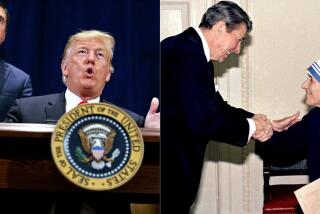President Is a Proverb-ial Storyteller With Russians
- Share via
MOSCOW — Ronald Reagan, the steely anti-Communist, sounded like a Russian babushka Sunday.
Although his Russian pronunciation sounds as if he is gargling pebbles, the President once more slipped a grandmotherly Slavic proverb into his summit remarks. Addressing Soviet leader Mikhail S. Gorbachev in the Kremlin, Reagan set aside air-launched cruise missiles and other grim matters of state in favor of an old-fashioned homily:
“In the past, Mr. General Secretary, you’ve taken note of my liking for Russian proverbs, and in order not to disappoint anyone on this visit, I thought I would mention a literary saying from your past, another example of your people’s succinct wisdom: rodilsya, ne toropilsya --it was born, it wasn’t rushed.”
Off to the side, Gorbachev seemed a bit confused by Reagan’s somewhat mangled version of the proverb. But when the flawless translation smoothed it all out, Gorbachev broke into a smile.
Reagan continued, in English:
“Mr. General Secretary, we did not rush, we have taken our work step by step. And I’ve come to continue that work. We both know it will not be easy.”
Language is an important part of these summit meetings, and Reagan put the words doverai, no proverai (“trust but verify”) into the American political lexicon when he used them in speeches and at earlier summits to signal a willingness to negotiate, but a need to check.
The phrase not only charmed Gorbachev, it went a long way toward placating right-wing conservatives who have deep reservations about the Intermediate-range Nuclear Forces (INF) treaty.
During the Washington summit in December, Gorbachev kidded Reagan for repeating the “trust but verify” proverb.
“You say that at every meeting!” Gorbachev said, laughing and breaking into a statement the president was making. Reagan laughed, too, and said, “I like it.” The incident was one of the most memorable personal moments at the Washington meeting.
The source of Reagan’s Russian folk wisdom could well be a young Leningrad dissident named Dmitri Shagin. Suzanne Massie, author of “Land of the Firebird,” visited Shagin in Leningrad and asked him extensively about Russian proverbs and jokes. Massie, in turn, has briefed the President on a number of occasions.
“I was watching Reagan (at the Washington summit) on television,” Shagin said in an interview, “and, lo and behold, my words came out of his mouth.”
Gorbachev opened Sunday’s ceremony at the Kremlin by paying homage to Reagan’s propensity for salt-of-the-Russian-earth language:
“Mr. President, you and Mrs. Reagan are here on your first visit to the Soviet Union, a country which you have so often mentioned in your public statements. Aware of your interest in Russian proverbs, let me add another one to your collection: ‘It is better to see once than to hear a hundred times.’ ”
Gorbachev, who was born of peasant parents in the village of Privolnye, is fond of the language and anecdotes of his grandparents and often uses proverbs when he visits the provinces.
One Muscovite who watched the speeches broadcast live on Soviet television Sunday said she thought that Reagan’s use of a Russian proverb was “a nice touch.”
“All those sayings are very much in the Russian language, especially with the older generation,” Tanya Zinman said. “What was nice was that rodilsya, ne toropilsya is not that common, not right on the tip of everyone’s tongue, but it is very authentically Russian.”
Another Russian, a secretary working for a Japanese newspaper, said, “I admit I’ve never heard that one. Usually only babushkas know those phrases well.”
More to Read
Sign up for Essential California
The most important California stories and recommendations in your inbox every morning.
You may occasionally receive promotional content from the Los Angeles Times.












